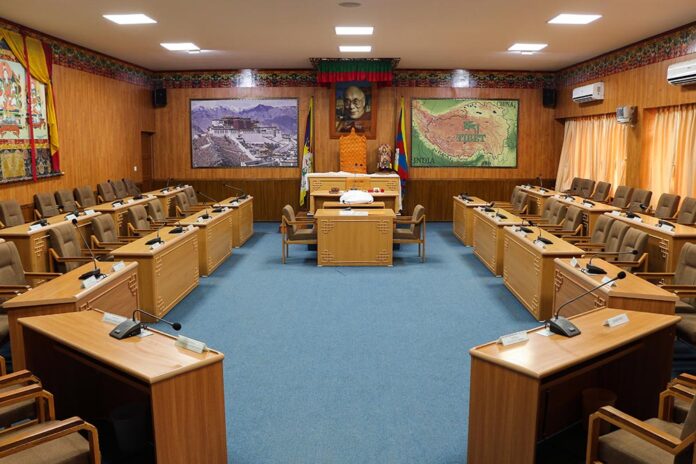(TibetanReview.net, Jul11’21) –
The reason why the 17th Tibetan Parliament in Exile (TPiE) cannot be formed is straightforward: a section of the elected members does not want to take their oath of office according to the Charter of Tibetans in Exile. And they have made it clear that they will not budge from this position.
This means that we will not have a TPiE for now. The Charter appears to be silent on how long we can remain without a TPiE. So, we face the prospect of not having a TPiE, possibly until after the next five-yearly election takes place. This also means we will have no TPiE-approved budgets to run the Central Tibetan Administration (CTA) for the next five years. So also no Kalons to head the various departments of the CTA, and the heads of all the bodies under the CTA which are required to be filled by the TPiE’s votes of approval. And there are sundry other matters which cannot be dealt with without the TPiE.
However, this is not how the group of 22 elected candidates (who do not want to take their oath under the Charter) appears to see it. The big problem is, they claim to have taken their oath in front of a portrait of His Holiness the Dalai Lama and a copy of the Charter and demands to be recognized as members of the 17th TPiE on that basis. However, this is highly problematic.
Firstly, their oath-taking does not accord with the provisions of the Charter, which they insist they respect. The Charter requires that the oath be administered by the pro tem speaker who then formally swears in the elected candidates as members of the TPiE. So the real choice before them was either to take the oath under the Charter or to refuse to do so. However, they imagined that they had a third way, which was simply not true.
Some in the group of 22 elected candidates have claimed that they took their oath under an arrangement made by the secretariat of the TPiE. But this, even if true, was a facile excuse because they knew that this was not in keeping with the provisions of the Charter and was therefore manifestly invalid. Even so, when queried by the Chief Tibetan Election Commissioner, the secretariat has denied any responsibility for involvement in any oath-taking arrangement that was not in accordance with the provisions of the Charter.
Secondly – and this is very important – the pro tem Speaker administers the oath as the official witness to the taking of oath of office by the elected candidates who then become members of the TPiE. And he swears in the members on the basis of being that official witness. So, the question is, who administered the oath to the 22 members to be the official witness to their oath-taking and who thereby swore them in, to be in a position to bear witness to their oath-taking later on?
Are we therefore suggesting that the 22 members take their oath of office from the pro tem Speaker? Yes, you bet we are. The point is there is no alternative. Either you respect the Charter and comply with it or you don’t. There is no third alternative. The Charter is not an optional piece of document, to be complied with when it suits you, only to be ignored when you don’t like it.
They may question the fact that the legitimacy of the pro tem Speaker was tainted by the fact that he took his oath of office and was sworn in by the Chief Justice Commissioner of the Tibetan Supreme Justice Commission (TSJC) whom they do not recognize.
The first answer to this question is, as stated above, there is no alternative. There is no other Chief Justice Commissioner to administer the oath; nor will there be one so long as the 17th TPiE remains to be constituted.
Taking oath from the pro tem speaker who was sworn in by the Chief Justice Commissioner may be questionable from their point of view. But it is still the most Charter-compliant mode for taking the oath under the existing circumstances. There is no other Charter-compliant way to administer the oath and swear in the members, short of making false, even fantastic, interpretations of the provisions of the Charter as happened during the removal of the entire panel of justice commissioners of the TSJC by the 16th TPiE on Mar 25.
The second answer is, taking oath from the pro tem speaker sworn in by the Chief Justice Commissioner may be questionable, but it is not downright in violation of the provisions of the Charter – certainly not in the way the group of 22 elected candidates supposedly took their oath without even an administerer to swear them in was.
The third answer is, the question about the legitimacy of the panel of justice commissioners of the TSJC after their resumption of office from May 24 is an issue that can easily be settled after the 17th TPiE is duly constituted. There is no way to settle it before that.
The fourth answer is, no permanent or irretrievable damage will be caused if oath is administered by the pro tem speaker sworn in by the Chief Justice Commissioner. The Sikyong has already been administered his oath of office and sworn in by the Chief Justice Commissioner in the presence of His Holiness the Dalai Lama.
The TPiE plays a significant national and international role in promoting the Tibetan cause and in the running of the CTA. All this will be absent if the formation of the 17th TPiE is held up on a mere fuss about the legitimacy of the panel of Justice Commissioners of the TSJC whose removal from office was, to begin with, patently illegal and a gross abuse of parliamentary procedure.






